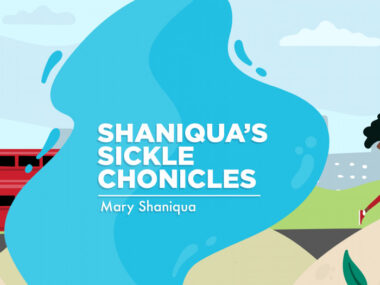It’s time to reclaim false narratives about sickle cell disease
Putting an end to harmful stigmas that persist across the globe
Written by |

Here in the U.K., October is Black History Month, and this year’s theme is “reclaiming narratives.” I believe that theme is particularly apt for sickle cell patients.
People with sickle cell disease have been subjected to false narratives for far too long. We face stigmas everywhere we go, simply because of our diagnosis — something that’s entirely out of our control. Unfortunately, people can be rather cruel when they haven’t experienced the same plight as others.
False narratives
Sickle cell is often erroneously considered a “Black disease.” Although it’s much more common in people of African descent, sickle cell patients exist across a range of creeds and races. Sadly, despite the differences in our cultural backgrounds and religious identities, we all seem to face the common issue of harmful stigmas.
Beliefs that sickle cell disease is a marker for death or karmic retribution because of ancestral sin or wrongdoing are commonplace. Across the global sickle cell community, it seems we’ve all been subjected to wicked beliefs that people hold over and against us.
I am of Yoruba descent, and in my mother tongue, there’s a slur used specifically for children born with sickle cell disease. The term is “abiku,” which translates loosely into “destined for death.” That’s jaw-dropping, isn’t it? Who in their right mind would say such a thing about other people’s children?
This belief is not limited to the Yoruba community. Other ethnic groups within Nigeria are no different, and I’ve heard sickle cell patients from other parts of Africa and Asia report experiencing the same horrific rhetoric.
It’s not unusual for parents to be told that they need not invest in their child with sickle cell, be it emotionally, financially, or academically. That’s because of the belief that parents won’t get a return on their “investment” because of the child’s suspected shorter life span. That view is particularly rife in areas that don’t have accessible healthcare infrastructure.
When I speak about these negative stigmas, those of us in the West, in particular, are often horrified and begin to judge people from other regions. Many believe that these kinds of ideas don’t exist in our nations. Au contraire.
Though different, stigmas against sickle cell patients persist in the Western world, too. In my experience, they often present in healthcare settings as the ludicrous belief that sickle cell patients are drug-seekers and not experiencing any real pain. I suspect that’s in part because of the outdated racist belief that Black people don’t feel pain in the same way that white people do. These notions can result in disastrous outcomes for sickle cell patients.
Reclaiming narratives
Such harmful narratives are far too common and have been permitted to spread like wildfire without consequence.
This Black History Month presents an opportunity for us to say, “Enough.” Our inherent value as human beings isn’t diminished by an illness.
To me, reclaiming narratives means respectfully standing up to people who perpetuate these negative beliefs. It’s about using our power to demonstrate how much we can achieve and deliver in spite of our condition. Sickle cell patients — and all Black disabled people — are more than a diagnosis.
We have the power to refuse to let others proclaim negativity over our lives. Our lives belong to us, and by taking ownership, we can make our existence as meaningful and successful as we want them to be. We demonstrate our resilience by fighting our health battles while still moving forward with life. We face so much negativity, but we don’t let it get us down. Our perseverance knows no bounds.
A way forward
It’s my prayer for all sickle cell patients and people with disabilities to experience the sweetness life has to offer. I ask the able-bodied community to do their part by challenging and interrogating any limiting beliefs they may hold against people like me. They’ll quickly find that these notions are unfounded and baseless.
Let’s work collectively to build an accessible world so that disabled people get their right to life. Let’s build a community that challenges biases and stigmas so that everyone can live fairly and freely.
Note: Sickle Cell Disease News is strictly a news and information website about the disease. It does not provide medical advice, diagnosis, or treatment. This content is not intended to be a substitute for professional medical advice, diagnosis, or treatment. Always seek the advice of your physician or other qualified health provider with any questions you may have regarding a medical condition. Never disregard professional medical advice or delay in seeking it because of something you have read on this website. The opinions expressed in this column are not those of Sickle Cell Disease News or its parent company, Bionews, and are intended to spark discussion about issues pertaining to sickle cell disease.






Esmie Dunbar
I am with you young lady.I am a mother with two o children born with sickle cell disease older daughter now 34years old and youngest daughter was 18 years old when the hospital killed her 4years a go she would be 22 years old in January 4,2024 Now l am bringing awareness for people wounded line condition especially sickle cells.Yes there is a stigma about sickle cells about be black especially the stigma that people with sickle cells died fast it’s a big lie the advance of technology allow people to live longer, but people need to stand up read get knowledge and fight against especially Doctors and medical professionals that try to tell you negative information about sickle cells they are ignorant, and we should not be ignorant like them. Get the facts I live in the United States.